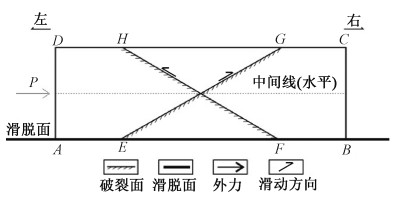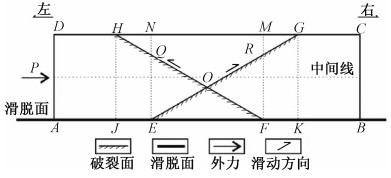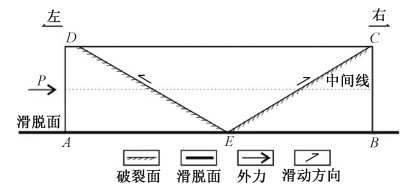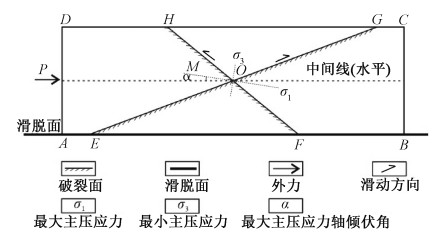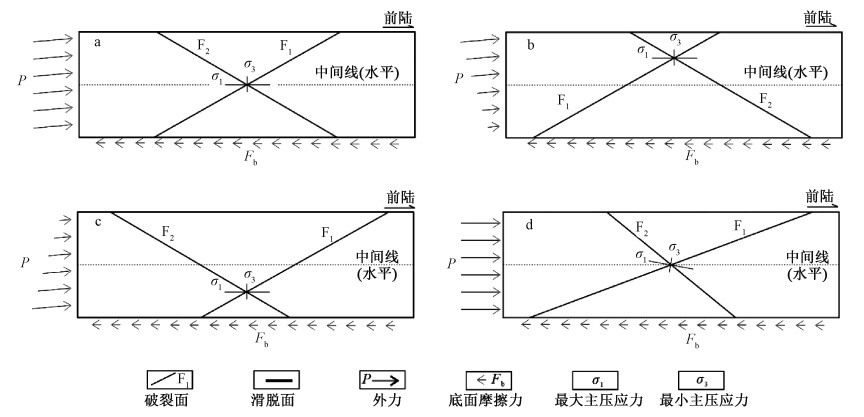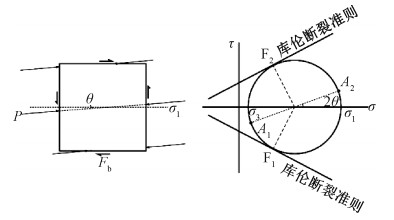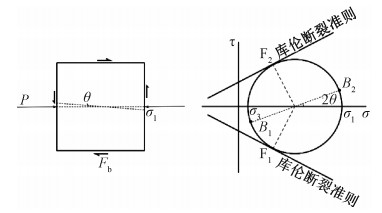Deformation asymmetry in foreland thrust belts and the kinematic direction of the related thrust faults
-
摘要:
前陆冲断带冲断层的冲断方向一直没有得到理论解释。文中基于库伦断裂理论和造山带前陆冲断带变形的非对称性,分析了前冲断层和反冲断层的成因。变形初期将会出现两组共轭势断裂面,随后在变形非对称引起的准静力平衡条件下,两组势断裂面中所需作用力小的那组断裂面将更容易发育成冲断层,断层滑动所需作用力包括克服滑脱面摩擦力和断层面摩擦力两部分。大部分条件下,前陆区前冲断层将优先发育,但当最大主应力轴向前陆倾斜时或共轭断层交叉点在滑脱面上时,反冲断层将有可能优先发育。后缘推动力、滑脱面摩擦力和滑体形状都会决定着主应力轴的方位。上述认识能够解释包括收缩变形区、伸展变形区等断层发育的选择性。
Abstract:The thrust directions in foreland thrust belts have not been explained on theory. Based on Coulomb fracture criterion and deformation asymmetry in foreland thrust belt, the origins of fore-thrust and back-thrust faults are analyzed in this paper. Two potential conjugate fractures would occur in initial deformation stage, and the fracture requiring less applied forces might develop into thrust fault under the quasi-static equilibrium caused by deformation asymmetry in foreland thrust belts. The applied forces needed to create fault movements include the frictions along both the detachment surface and the fault surface. The fore-thrust faults will occur in most deformations in foreland thrust belts. However, where either the principal stress axes tilt toward foreland or the intersections point of the two conjugate fractures are on the detachment surface, the back-thrust faults will be preferable to occur. The applied force, the frictions along the detachment surface and the geometries of the slipping terranes will determine the principal stress axes. The findings will help to explain the selectivity of the fault dips in both contractional and extensional deformation areas.
-

-
ALSOP G I, MARCO S, WEINBERGER R, et al., 2017. Upslope-verging back thrusts developed during downslope-directed slumping of mass transport deposits[J]. Journal of Structural Geology, 100: 45-61. https://www.sciencedirect.com/science/article/pii/S0191814117300974
ANDERSON E M, 1951. The dynamics of faulting and dyke formation with applications to Britain[M]. 2nd ed. Edinburgh: Oliver and Boyd.
BONINI M, 2007. Deformation patterns and structural vergence in brittle-ductile thrust wedges: an additional analogue modelling perspective[J]. Journal of Structural Geology, 29(1): 141-158. doi: 10.1016/j.jsg.2006.06.012
BUITER S J H, 2012. A review of brittle compressional wedge models[J]. Tectonophysics, 530-531: 1-17. doi: 10.1016/j.tecto.2011.12.018
BYRNE D E, WANG W H, DAVIS D M, 1993. Mechanical role of backstops in the growth of forearcs[J]. Tectonics, 12(1): 123-144. doi: 10.1029/92TC00618
CHEN B L, 2020. Development process of fault structure and formation and evolution of ore-controlling structure: a case study of the Zoujiashan uranium deposit[J]. Journal of Geomechanics, 26(3): 285-298. (in Chinese with English abstract)
CHEN S P, ZHONG J H, SONG Q Y, 1998. A new method to determine the differential stress of dip-slip faults[J]. Journal of Geomechanics, 4(3): 36-40. (in Chinese with English abstract)
CHEN S P, YUN J B, LIU Z N, et al., 2018. Back-thrust faults and their formation mechanism in Tangxibei structural belt, Tarim basin [J]. Science and Technology Innovation Herald, 15(3): 127-131. (in Chinese)
COSTA E, VENDEVILLE B C, 2002. Experimental insights on the geometry and kinematics of fold-and-thrust belts above weak, viscous evaporitic décollement[J]. Journal of Structural Geology, 24(11): 1729-1739. doi: 10.1016/S0191-8141(01)00169-9
DAHLEN F A, 1990. Critical taper model of fold-and-thrust belts and accretionary wedges[J]. Annual Review of Earth and Planetary Sciences, 18: 55-99. doi: 10.1146/annurev.ea.18.050190.000415
DAVIS D, SUPPE J, DAHLEN F A. 1983. Mechanics of fold-and-thrust belts and accretionary wedges[J]. Journal of Geophysical Research: Solid Earth, 88(B2): 1153-1172. doi: 10.1029/JB088iB02p01153
DONG Y P, ZHANG G W, 1997. Some ideas and advances in studies of tectonics and dynamics of orogenic belt and foreland basin[J]. Advance in Earth Sciences, 12(1): 1-6. (in Chinese with English abstract)
DULA W F JR, 1991. Geometric models of Listric normal faults and rollover folds[J]. AAPG Bulletin, 75(10): 1609-1625.
GRAVELEAU F, MALAVIEILLE J, DOMINGUEZ S, 2012. Experimental modelling of orogenic wedges: a review[J]. Tectonophysics, 538-540: 1-66.
GUO Y, TANG L J, YU T X, et al., 2016. Fault features and formation mechanism of Madong structural belt in Tanggubasi depression, Tarim basin[J]. Geotectonica et Metallogenia, 40(4): 643-653. (in Chinese with English abstract)
GUTSCHER M A, KLAESCHEN D, FLUEH E, et al., 2001. Non-Coulomb wedges, wrong-way thrusting, and natural hazards in Cascadia[J]. Geology, 29(5): 379-382. doi: 10.1130/0091-7613(2001)029<0379:NCWWWT>2.0.CO;2
HAFNER W, 1951. Stress distributions and faulting[J]. GSA Bulletin, 62(4): 373-398. doi: 10.1130/0016-7606(1951)62[373:SDAF]2.0.CO;2
HAN L J, HE Y N, ZHANG H Q, 2016. Study of rock splitting failure based on Griffith strength theory[J]. International Journal of Rock Mechanics and Mining Sciences, 83: 116-121. doi: 10.1016/j.ijrmms.2015.12.011
HE D F, YIN C, DU S K, et al., 2004. Characteristics of structural segmentation of foreland thrust belts: A case study of the fault belts in the northwestern margin of Junggar Basin[J]. Earth Science Frontiers, 11(3): 91-101. (in Chinese with English abstract)
HE W G, Zhou J X, Yuan K, 2018. Deformation evolution of Eastern Sichuan-Xuefeng fold-thrust belt in South China: Insights from analogue modelling[J]. Journal of Structural Geology, 109: 74-85. doi: 10.1016/j.jsg.2018.01.002
HUANG J C, WAN Y G, SHENG S Z, et al., 2016. Heterogeneity of present-day stress field in the Tonga-Kermadec subduction zone and its geodynamic significance[J]. Chinese Journal of Geophysics, 59(2): 578-592. (in Chinese with English abstract)
KENT W N, HICKMAN R G, DASGUPTA U, 2002. Application of a ramp/flat-fault model to interpretation of the Naga thrust and possible implications for petroleum exploration along the Naga thrust front[J]. AAPG Bulletin, 86(12): 2023-2045.
LI W, CHEN S P, YUN J B, et al., 2018. Formation mechanism of steeply inclined reverse fault: take the Serikbuya fault in Tarim basin as an example[J]. Journal of Geomechanics, 24(1): 1-8. (in Chinese with English abstract)
LI Z W, LIU S G, LUO Y H, et al., 2007. Structural style and deformational mechanism of southern Dabashan foreland fold-thrust belt in central China[J]. Geotectonica et Metallogenia, 30(3): 294-304. (in Chinese with English abstract)
LIU X, LI S Z, SUO Y H, et al., 2010. Orogenic extrusion tectonics and exhumation of high/ultrahigh-pressure rocks: a case study from the Dabie Orogen[J]. Earth Science Frontiers, 17(4): 185-196. (in Chinese with English abstract)
MACKAY M E, 1995. Structural variation and landward vergence at the toe of the Oregon accretionary prism[J]. Tectonics, 14(6): 1309-1320. doi: 10.1029/95TC02320
MAITRA A, ANCZKIEWICZ A A, ANCZKIEWICZ R, et al., 2021. Thrusting sequence in the western Himalayan foreland basin during the late phase of continental collision defined by low-temperature thermochronology[J]. Tectonophysics, 821: 229145. doi: 10.1016/j.tecto.2021.229145
MORLEY C K, 1988. Out-of-sequence thrusts[J]. Tectonics, 7(3): 539-561. doi: 10.1029/TC007i003p00539
POBLET J, LISLE R J, 2011. Kinematic evolution and structural styles of fold-and-thrust belts[M]//POBLET J, LISLE R J. Kinematic evolution and structural styles of fold-and-thrust belts. Bath: Geological Society of London: 1-24.
SAVAGE H M, COOKE M L, 2003. Can flat-ramp-flat fault geometry be inferred from fold shape?: A comparison of kinematic and mechanical folds[J]. Journal of Structural Geology, 25(12): 2023-2034. doi: 10.1016/S0191-8141(03)00080-4
SCHOLZ C H, DAWERS N H, YU J Z, et al., 1993. Fault growth and fault scaling laws: preliminary results[J]. Journal of Geophysical Research: Solid Earth, 98(B12): 21951-21961. doi: 10.1029/93JB01008
SHAN J Z, 2004. Three-dimensional physical experiments of symmetrical fold[J]. Petroleum Exploration and Development, 31(5): 8-10. (in Chinese with English abstract)
SHERKATI S, LETOUZEY J, DE LAMOTTE D F, 2006. Central Zagros fold-thrust belt (Iran): new insights from seismic data, field observation, and sandbox modeling[J]. Tectonics, 25(4): TC4007.
SIMPSON G, 2011. Mechanics of non-critical fold-thrust belts based on finite element models[J]. Tectonophysics, 499(1-4): 142-155. doi: 10.1016/j.tecto.2011.01.004
SONG S H, CHEN S P, HE M Y, 2012. The investigation of normal fault under upwelling force and its critical stress state[J]. Journal of Geomechanics, 18(2): 149-157. (in Chinese with English abstract)
SOULOUMIAC P, MAILLOT B, LEROY Y M, 2012. Bias due to side wall friction in sand box experiments[J]. Journal of Structural Geology, 35: 90-101. doi: 10.1016/j.jsg.2011.11.002
SUSANNE J H B, 2012. A review of brittle compressional wedge models. Tectonophysics, 530-531: 1-17. doi: 10.1016/j.tecto.2011.12.018
TIBALDI A, ALANIA V, BONALI F L, et al., 2017. Active inversion tectonics, simple shear folding and back-thrusting at Rioni Basin, Georgia[J]. Journal of Structural Geology, 96: 35-53. doi: 10.1016/j.jsg.2017.01.005
TWISS R J, MOORES E M, 1992. Structural geology[M]. New York: W. H. Freeman and Company.
WANG K L, HU Y, 2006. Accretionary prisms in subduction earthquake cycles: the theory of dynamic Coulomb wedge[J]. Journal of Geophysical Research: Solid Earth, 111(B6): B06410. https://agupubs.onlinelibrary.wiley.com/doi/10.1029/2005JB004094
WANG P, LIU S F, ZHENG H B, et al., 2013. Late-orogenic arcuate fold-thrust belts in northern Yangtze area: structural characteristics and basin evolution[J]. Journal of Palaeogeography, 15(6): 819-838. (in Chinese with English abstract)
WANG R R, ZHANG Y Q, XIE G A, et al., 2011. Origin of the Dabashan foreland salient: insights from sandbox modeling[J]. Acta Geologica Sinica, 85(9): 1409-1419. (in Chinese with English abstract)
XU S Q, FUKUYAMA E, BEN-ZION Y, et al., 2015. Dynamic rupture activation of backthrust fault branching[J]. Tectonophysics, 644-645: 161-183. doi: 10.1016/j.tecto.2015.01.011
YIN Z M, RANALLI G, 1992. Critical stress difference, fault orientation and slip direction in anisotropic rocks under non-Andersonian stress systems[J]. Journal of Structural Geology, 14(2): 237-244. doi: 10.1016/0191-8141(92)90060-A
ZHANG Y P, ZHENG W J, YUAN D Y, et al., 2021. Geometrical imagery and kinematic dissipation of the late Cenozoic active faults in the West Qinling Belt: implications for the growth of the Xizang Plateau[J]. Journal of Geomechanics, 27(2): 159-177. (in Chinese with English abstract) http://qikan.cqvip.com/Qikan/Article/Detail?id=7104451158
陈柏林, 2020. 断裂构造发育过程与控矿构造形成演化: 以邹家山铀矿床为例[J]. 地质力学学报, 26(3): 285-298. https://journal.geomech.ac.cn/cn/article/doi/10.12090/j.issn.1006-6616.2020.26.03.027
陈书平, 钟建华, 宋全友, 1998. 一种求解倾斜滑动断层差应力的方法[J]. 地质力学学报, 4(3): 36-40. https://journal.geomech.ac.cn/article/id/74bf0aa7-2cf8-44b2-b6e8-7cf67b37bda5
陈书平, 云金表, 刘志娜, 等, 2018. 塔里木盆地塘西北反冲断层及其形成机制[J]. 科技创新导报, 15(3): 127-131. https://www.cnki.com.cn/Article/CJFDTOTAL-ZXDB201803077.htm
董云鹏, 张国伟, 1997. 造山带与前陆盆地结构构造及动力学研究思路和进展[J]. 地球科学进展, 12(1): 1-6. https://www.cnki.com.cn/Article/CJFDTOTAL-DXJZ701.000.htm
郭颖, 汤良杰, 余腾孝, 等, 2016. 塔里木盆地塘古巴斯坳陷玛东构造带断裂特征及成因探讨[J]. 大地构造与成矿学, 40(4): 643-653. https://www.cnki.com.cn/Article/CJFDTOTAL-DGYK201604002.htm
何登发, 尹成, 杜社宽, 等, 2004. 前陆冲断带构造分段特征: 以准噶尔盆地西北缘断裂构造带为例[J]. 地学前缘, 11(3): 91-101. doi: 10.3321/j.issn:1005-2321.2004.03.011
黄骥超, 万永革, 盛书中, 等, 2016. 汤加-克马德克俯冲带现今非均匀应力场特征及其动力学意义[J]. 地球物理学报, 59(2): 578-592. https://www.cnki.com.cn/Article/CJFDTOTAL-DQWX201602017.htm
李伟, 陈书平, 云金表, 等, 2018. 陡倾逆断层形成机制: 以塔里木盆地色力布亚断层为例[J]. 地质力学学报, 24(1): 1-8. https://journal.geomech.ac.cn/cn/article/doi/10.12090/j.issn.1006-6616.2018.24.01.001
李智武, 刘树根, 罗玉宏, 等, 2006. 南大巴山前陆冲断带构造样式及变形机制分析[J]. 大地构造与成矿学, 30(3): 294-304. doi: 10.3969/j.issn.1001-1552.2006.03.004
刘鑫, 李三忠, 索艳慧, 等, 2010. 造山带挤出构造与高压-超高压岩石剥露机制: 以大别山为例[J]. 地学前缘, 17(4): 185-196. https://www.cnki.com.cn/Article/CJFDTOTAL-DXQY201004022.htm
单家增, 2004. 对称褶皱形成的三维构造物理模拟实验[J]. 石油勘探与开发, 31(5): 8-10. doi: 10.3321/j.issn:1000-0747.2004.05.002
宋随宏, 陈书平, 何明宇, 2012. 上拱力背景下正断裂剖面形态及极限应力状态研究[J]. 地质力学学报, 18(2): 149-157. doi: 10.3969/j.issn.1006-6616.2012.02.005 https://journal.geomech.ac.cn/article/id/d01b5133-fd92-4f3a-aee3-81fc41d5eb66
王平, 刘少峰, 郑洪波, 等, 2013. 扬子北缘晚造山阶段弧形构造特征与盆地演化[J]. 古地理学报, 15(6): 819-838. https://www.cnki.com.cn/Article/CJFDTOTAL-GDLX201306009.htm
王瑞瑞, 张岳桥, 解国爱, 等, 2011. 大巴山前陆弧形构造的成因: 来自砂箱实验的认识[J]. 地质学报, 85(9): 1409-1419. https://www.cnki.com.cn/Article/CJFDTOTAL-DZXE201109003.htm
张逸鹏, 郑文俊, 袁道阳, 等, 2021. 西秦岭晚新生代构造变形的几何图像、运动学特征及其动力机制[J]. 地质力学学报, 27(2): 159-177. https://journal.geomech.ac.cn/cn/article/doi/10.12090/j.issn.1006-6616.2021.27.02.017
-



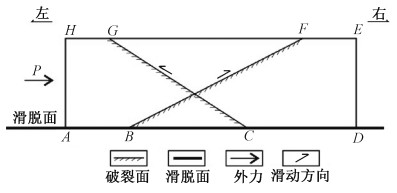
 下载:
下载:
